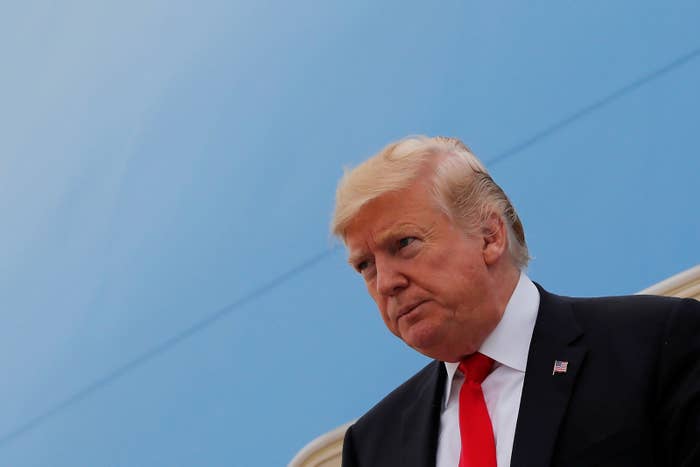
Democrats in Congress can move forward with a lawsuit claiming President Donald Trump's ongoing ties to his business empire violate the US Constitution, a federal judge ruled Friday.
The ruling isn't about the merits of the members' allegations — the judge only concluded that they had standing to bring the lawsuit in the first place. But it means congressional Democrats cleared a critical first hurdle in pursuing novel claims under the Constitution's Foreign Emoluments Claims against Trump.
The decision by US District Judge Emmet Sullivan in Washington, DC, represents the latest loss for Trump in his efforts to knock out lawsuits over his decision not to divest from his interests in the Trump Organization when he assumed the presidency. A federal judge in Maryland has previously denied Trump's motions to dismiss a lawsuit filed by local officials in the District of Columbia and Maryland, accusing Trump of violating the Domestic Emoluments Clause and the Foreign Emoluments Clause by keeping his interest specifically in the Trump International Hotel in downtown Washington.
More than 200 members of Congress, led by Sen. Richard Blumenthal, sued Trump in June 2017, accusing him of violating the Foreign Emoluments Clause. The clause states that "no Person holding any Office of Profit or Trust under them, shall, without the Consent of the Congress, accept of any present, Emolument, Office, or Title, of any kind whatever, from any King, Prince, or foreign State." The purpose of the clause, the judge noted in Friday's opinion, was to try to prevent "corruption and foreign influence."
Democrats argued that because the Trump Organization profits from doing business with foreign governments, and Trump hasn't divested his financial interests in his companies, he was violating the emoluments clause by failing to ask Congress for permission to accept those financial benefits.
Trump has pledged to donate profits the Trump Organization earned from doing business with foreign governments, and the company has sent funds to the US Treasury. But Democrats argued that it's not just about money, and that there are other benefits Trump's companies could get from foreign governments, such as trademarks and favorable regulations.
In Friday's 58-page decision, Sullivan found that members had done enough at this stage of the case to show that they had suffered an "institutional injury" because they were being denied their right to give or withhold their consent.
"Plaintiffs adequately allege that the President has completely nullified their votes in the past because he has accepted prohibited foreign emoluments as though Congress had provided its consent. And he will completely nullify their votes in the future for the same reason, as plaintiffs allege that he intends to continue this practice," the judge wrote.
The Justice Department argued that this case was the sort of intra-branch political fight that the courts shouldn't get involved in. Sullivan wrote that it did raise separation of powers concerns, but that it could still proceed in court because congressional Democrats had "no adequate legislative remedy."
The government also argued that Democrats weren't being denied a right to vote, because they could still vote on legislation addressing whether Trump had violated the emoluments clause. Sullivan wrote that this argument missed the point — the fact that Democrats could vote on legislation related to emoluments wasn't the same as voting on a particular emolument presented by the president for approval, per the terms of the Foreign Emoluments Clause.
The judge found that in arguing that Democrats could still vote on emoluments-related legislation, the government was asking the court to ignore the clause altogether. The burden was on the president to convince members to approve of an emolument he wanted to accept, Sullivan wrote — it was not on Democrats to convince their colleagues to vote on other legislation.
Sullivan will now move to the rest of Trump's arguments about why the case should be dismissed — the government is arguing that Democrats are pressing too broad a definition of "emolument," and that the term wasn't meant to apply to a president's private business interests that don't involve him acting in his capacity as president on behalf of a foreign government. The Justice Department lost on variations of these arguments in the Maryland case, but that opinion isn't binding on Sullivan.
The Constitutional Accountability Center is representing the congressional Democrats who sued. The center's president, Elizabeth Wydra, released a statement calling the decision a "momentous ruling."
"By recognizing that Members of Congress have standing to sue, the court proved to all in America today that no one is above the law, not even the President," Wydra said. "We look forward to making our case on the merits in coming weeks that President Trump is violating the Foreign Emoluments Clause and must be permanently enjoined from doing so."
Justice Department spokesperson Kelly Laco said in an email to BuzzFeed News, "As we argued, we believe this case should be dismissed, and we will continue to defend the President in court."
On a call with reporters, Blumenthal said the ruling was a "major breakthrough ... for the rule of law."
"We brought this lawsuit because we want to hold the President accountable for violating the chief anti-corruption provision of the United States Constitution, the Foreign Emoluments Clause. This clause of the Constitution assures that an American President puts the public interest ahead of private gain," Blumenthal said.

